定语从句讲解比较专练
图片预览
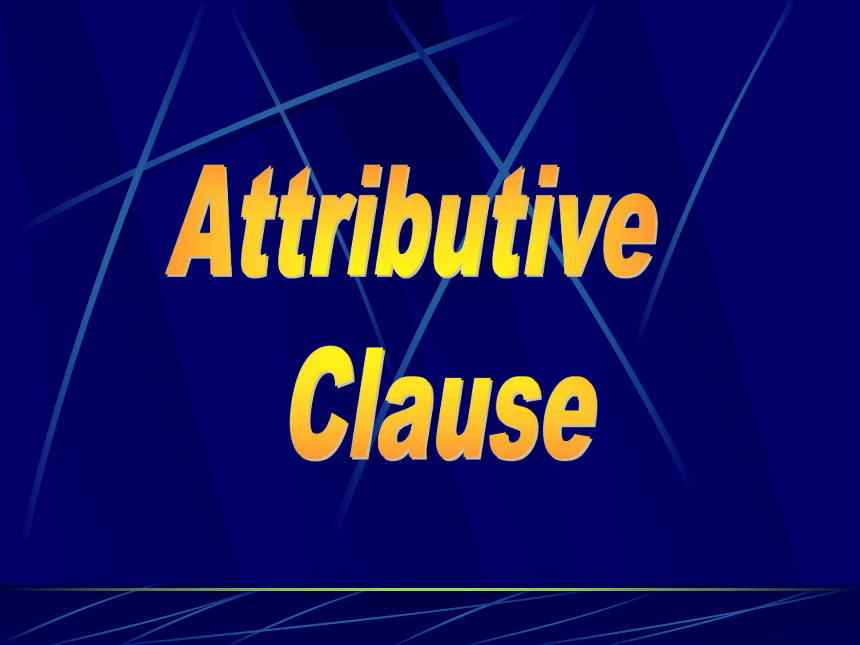
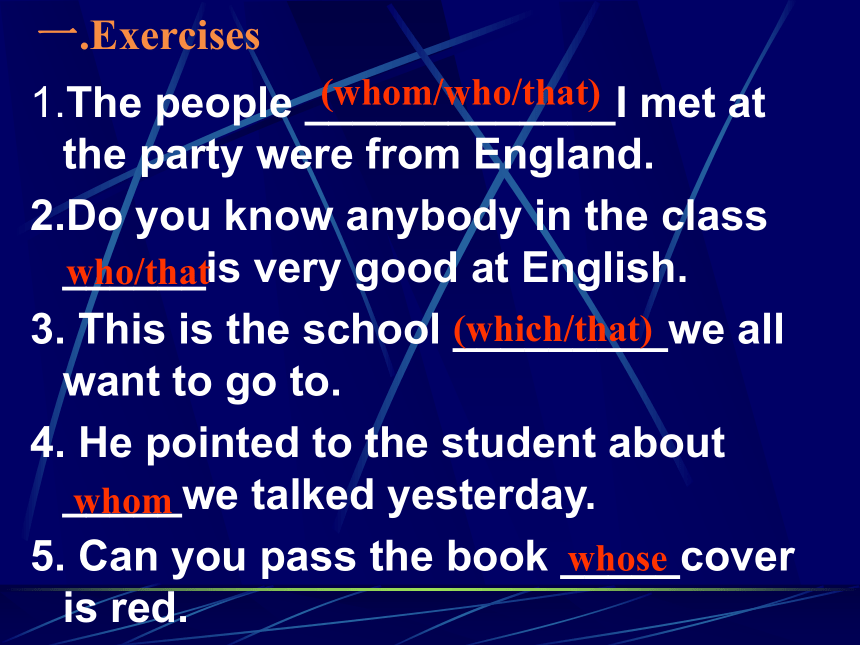
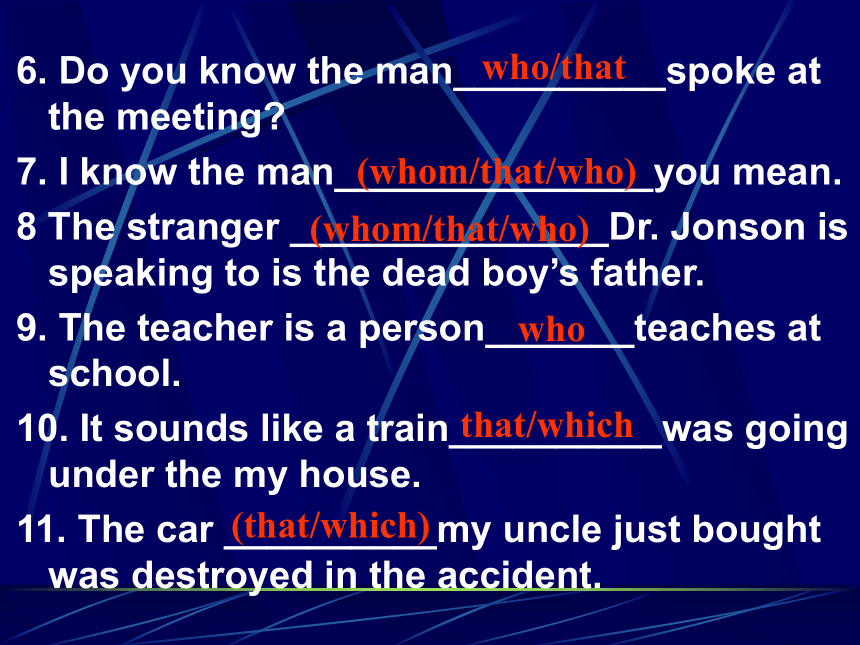
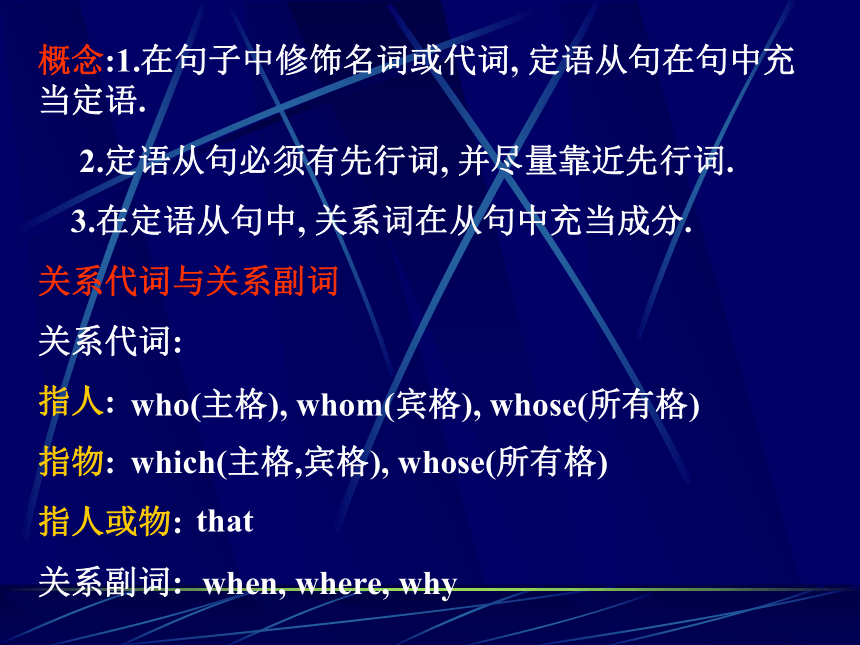
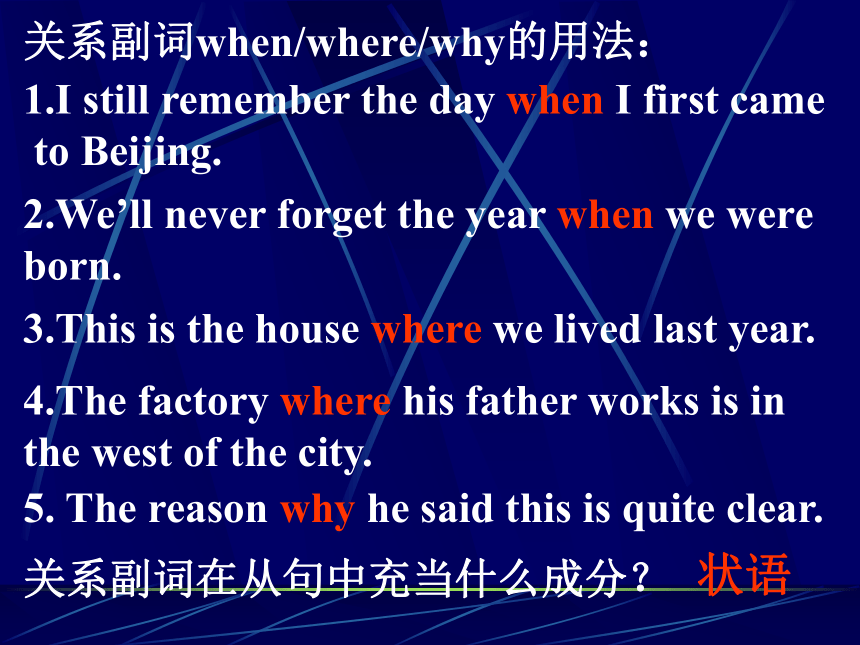
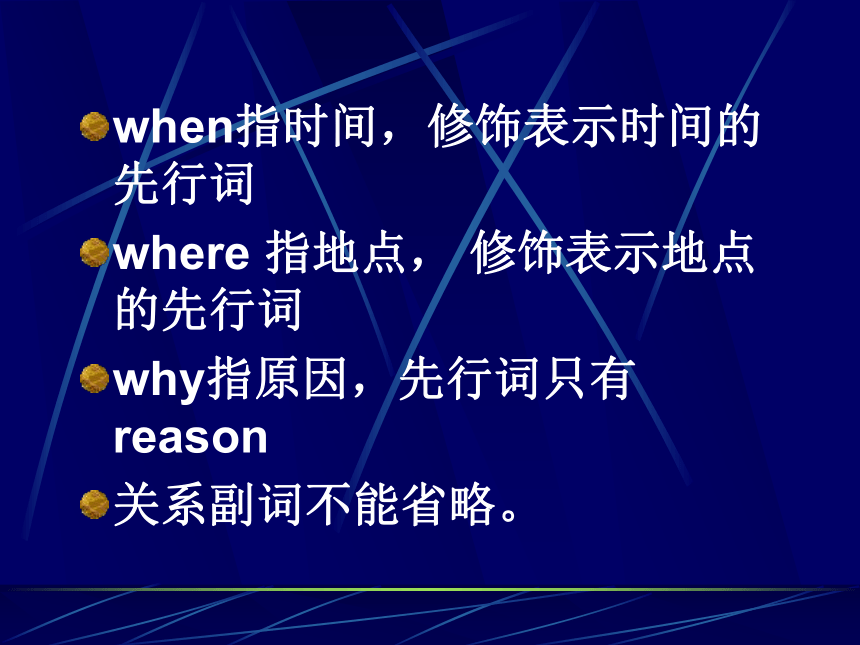

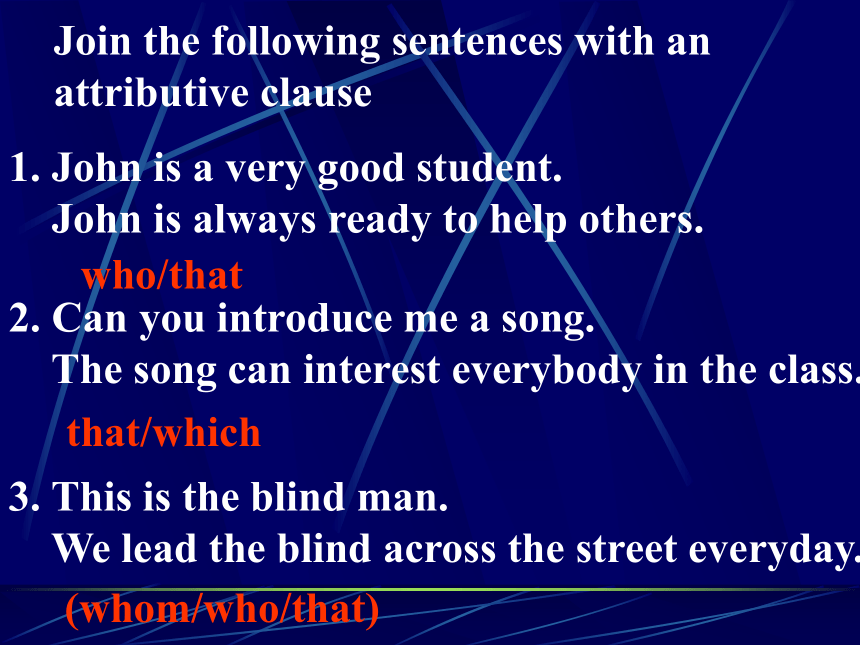
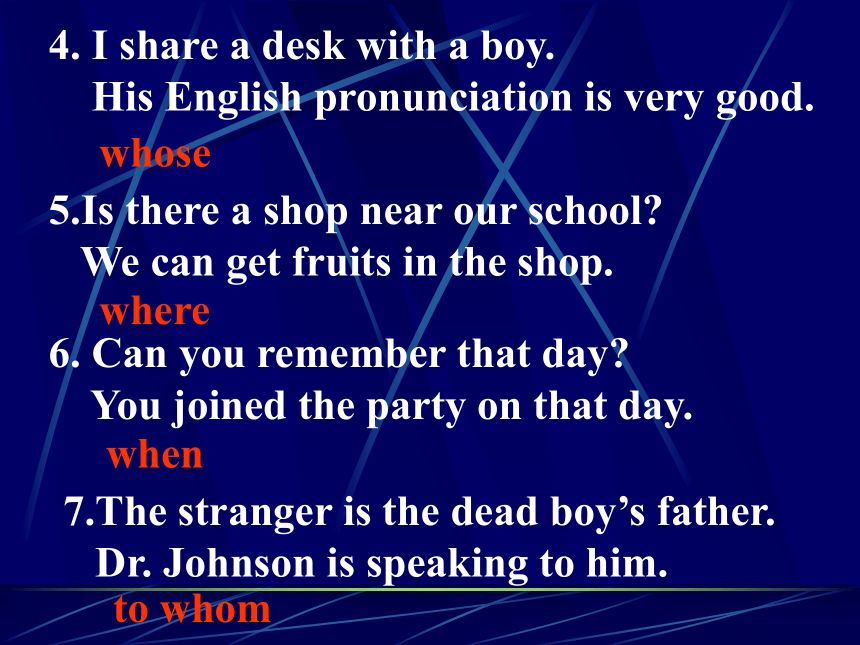
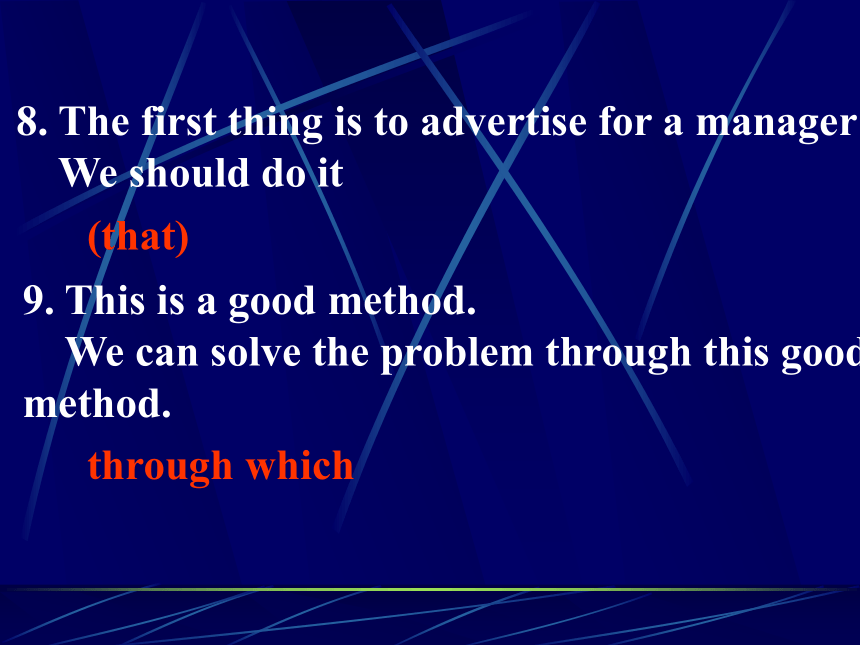
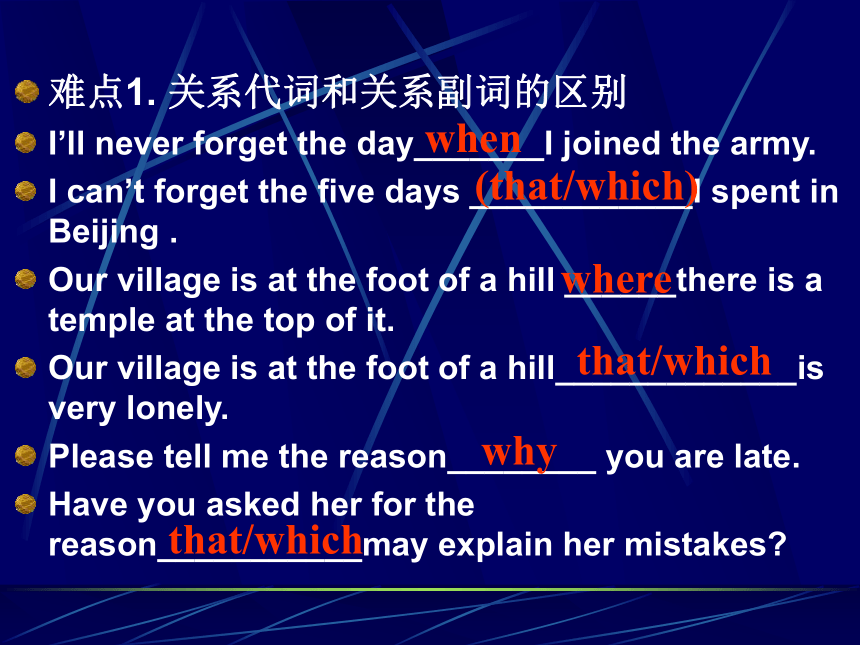
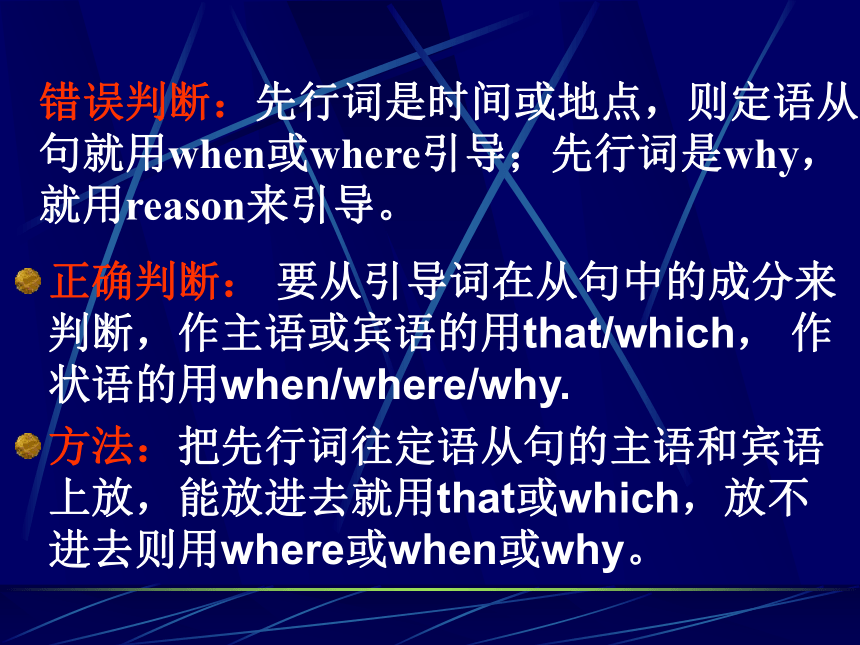
文档简介
课件36张PPT。Attributive
Clause1.The people _____________I met at the party were from England.
2.Do you know anybody in the class ______is very good at English.
3. This is the school _________we all want to go to.
4. He pointed to the student about _____we talked yesterday.
5. Can you pass the book _____cover is red. (whom/who/that)who/that(which/that)whomwhose一.Exercises 6. Do you know the man__________spoke at the meeting?
7. I know the man_______________you mean.
8 The stranger _______________Dr. Jonson is speaking to is the dead boy’s father.
9. The teacher is a person_______teaches at school.
10. It sounds like a train__________was going under the my house.
11. The car __________my uncle just bought was destroyed in the accident.
who/that(whom/that/who)(whom/that/who)whothat/which(that/which)概念:1.在句子中修饰名词或代词, 定语从句在句中充当定语.
2.定语从句必须有先行词, 并尽量靠近先行词.
3.在定语从句中, 关系词在从句中充当成分.
关系代词与关系副词
关系代词:
指人:
指物:
指人或物:
关系副词:who(主格), whom(宾格), whose(所有格)
which(主格,宾格), whose(所有格) thatwhen, where, why关系副词when/where/why的用法:1.I still remember the day when I first came
to Beijing.2.We’ll never forget the year when we were
born.3.This is the house where we lived last year.4.The factory where his father works is in the west of the city.5. The reason why he said this is quite clear.关系副词在从句中充当什么成分?状语when指时间,修饰表示时间的先行词
where 指地点, 修饰表示地点的先行词
why指原因,先行词只有reason
关系副词不能省略。如何正确理解关系代词和关系副词Do you see the man who we met him last week.
There is a shop near our school where we can buy coffee in it.
They live in a building ,in front of its gate stands an old tree.
(F)(F)(F)关系代词和关系副词除了指代作用还有
连接作用。whoseJoin the following sentences with an
attributive clause John is a very good student.
John is always ready to help others.2. Can you introduce me a song.
The song can interest everybody in the class. 3. This is the blind man.
We lead the blind across the street everyday. who/thatthat/which(whom/who/that)4. I share a desk with a boy.
His English pronunciation is very good. 5.Is there a shop near our school?
We can get fruits in the shop.6. Can you remember that day?
You joined the party on that day.7.The stranger is the dead boy’s father.
Dr. Johnson is speaking to him. wherewhento whomwhose8. The first thing is to advertise for a manager
We should do it9. This is a good method.
We can solve the problem through this good method.(that)through which难点1. 关系代词和关系副词的区别
I’ll never forget the day_______I joined the army.
I can’t forget the five days ____________I spent in Beijing .
Our village is at the foot of a hill ______there is a temple at the top of it.
Our village is at the foot of a hill_____________is very lonely.
Please tell me the reason________ you are late.
Have you asked her for the reason___________may explain her mistakes?
when(that/which)wherethat/whichwhythat/which正确判断: 要从引导词在从句中的成分来判断,作主语或宾语的用that/which, 作状语的用when/where/why.
方法:把先行词往定语从句的主语和宾语上放,能放进去就用that或which,放不进去则用where或when或why。错误判断:先行词是时间或地点,则定语从
句就用when或where引导;先行词是why,
就用reason来引导。难点2. 关系副词和关系代词的转化I know a wood where you can find wild strawberries.
= I know a wood in which you can find wild strawberries.
I can still remember the day when I was born.
= I can still remember the day on which I was born.
The reason why he didn't come was not clear.
= The reason for which he didn’t come was not clear.A.在定语从句中, 关系副词when 和where都可以转化成prep.+which,介词的选择取决于它和先行词的搭配
B. 关系副词why只能转化成for+ which1.Do you know the reason _________ I came late?2.Is there a shop around _______ we can get fruits?3.Can you still remember the day _________ you joined the Party?4.Is this the university ________ your brother studied five years ago?5.What’s the name of the place ________ you spent your holiday?.6.The reason ________ I’m phoning you is to invite you to a party.for whichin whichon whichin whichin whichfor which难点3. whose 的转化He lives in a big house whose windows
are very old.
= He lives in a big house the window of which
are very old.3) She is the student _______father is a CEOwhose2)I can’t work out the math problem whose answer seemed quite strange.
= I can’t work out the math problem the
answer of which seemed quite strange.在whose表示物时, whose可以转化成
the+noun+of+which的形式, 但whose 表示人时则不可以。难点4. way后面的定语从句They are trying to find a way ________ can help us study better
He’s explaining a new way__________ we are interested in.
I don’t like the way _______ you talk.that/which(that/which)in whichI don’t like the way that you talk .I don’t like the way you talk.(T)(T)way 后面的两种定语从句:
1)way在定语从句中起名词的作用,担任主语或宾语,用that/which引导.
2)way在定语从句中起副词的作用,担任状语,表示in the way的意思可以用that/in which 引导,或干脆都不用。难点5. the first/last time, the moment后的定语从句The moment (that) he came in we stopped talking.
The last time(that) we saw him was in his school.
可以用when 来替代that吗?
No在the first/last time, the moment后的定语从句不能用when引导, 可用that, 但最常见的是什么都不用。难点6. 以as引导的定语从句I want to buy the same book as you bought yesterday.
It is such an interesting story as I have never heard before.
As you can see, he does not quite agree with what we said.
I want to buy the same bike as is shown in the window.
The explanation is unreasonable, as we all know. 定语从句中as是关系代词, 作主语或宾语。
在以下结构时用as引导:
The same…as 和such…as句型中
非限定性定语从句放在句首时
在以下意义时用as引导:
“正如”, “众所周知”
比较如下两个句子
It is such an interesting story as I have never heard before.
It is such an interesting story that I have never heard it before.定语从句结果状语从句Translate the two sentences:
He told us all that he knew.
b. He told us all what he knew难点7. all 后面的定语从句what不能引导定语从句all the thingsall of us 难点9. 从句中的谓语问题A teacher is a person who_______at school.(teach)
It sounded like a train that_____going under my home. (be)
I, who_____your friend, will try my best to help you. (be)
He is one of the students who______English. (like)
He is the only one of the students who______the piano well (play)teacheswasamlikeplays关系代词who, that, which在从句中作主语时,从句谓语动词的人称和数与其所修饰的先行词必须一致。注意:先行词有下列情况或附有下列修饰语时,通常用关系代词 that。
1)先行词是all, no, none, everyone, something, much, little 等;
2)先行词前有序数词(the first…), 形容词最高级(the best…), the last, the same, the only 等;
3)如果先行词中既含有表示人的名词又有表示物的名词时;
4)若主句中有疑问代词 who 或者 which,为了避免重复, 关系代词不要再用 who, which,而用 that。1. This is all ____ I know about the matter.
A. that B. what C. who D. whether
2. Is there anything else _____ you require?
A. which B. that C. who D. what
3. The last place _____ we visited was the Great Wall.
A. which B. that C. where D. it
4. He talked happily about the men and books
_____ interested him greatly in the school.
A. which B. that C. it D. whom5. There is no dictionary _____ you can find everything.
A. that B. which C. where D. in that
6. This is one of the best books _______.
A. that have ever been written
B. that has ever been written
C. that has written
D. that have written7. Is oxygen the only gas _____ helps fire burn?
A. that B. / C. which D. it提醒: 介词﹢关系代词引导的定语从句, 关键是判断介词的选择, 方法一是看从句谓语部分缺少什么介词(习惯搭配), 再则可以通过整个句子整体含义来判断, 结合生活实际来判断.例:The Second World War _____ millions of people were killed in 1945.
A. during which B. in that
C. where D. on which1. Do you know who lives in the building ___ there
is a well?
A. in front of it B. in front of whose
C. in front of which D. in front which
2. I’ll never forget the day ____ I joined the League.
A. on which B. in which
C. which D. at which
3. Jean was her old friend, __ she borrowed a necklace.
A. from who B. from whom
C. to that D. to whom
5. His glasses, _____ he was like a blind man, fell to
the ground and broke its leg.
A. which B. with which
C. without which D. that6. Do you know the reason ____ he was late?
that B. which
C. for what D. for which7. I have bought two ballpens, ____ writes well.
A. none of which B. neither of which
C. none of them D. neither of them提示: as ,which 均可以引出非限制性定语从句,如都 指前一句话, 二者可以互换。as 引导的从句可以放在句首, as 本身有“正如…..正象…”之意,与之连用的词有 know, see, expect, announce, point out 等。此外, 在the same…as…;such…as...中 as 引导的是限制性定语从句.例:The earth is round, _____we all know.
A. that B. which C. who D. as He went abroad, as / which was expected.
He went abroad, which was unexpected.1. ______ was natural, he married Jenny.
A. Which B. That
C. This D. As
2. Such signs _____ we use in the experiment ______
Greek letters.
A. as, are B. as, is
C. that, are D. that, is
3. I passed him a large glass of whisky, _____ he
drank immediately.
A. that B. as C. which D. who4. She is very good at dance, ____ everybody knows.
A. that B. which C. who D. as
5. It was raining, _____ was a pity.
A. what B. that C. the which D. which
6. ______ has been said above, grammar is a set of
dead rules.
A. Which B. What C. That D. As
7. We do the same work _____ they do.
A. which B. as C. than D. likeBye-Bye
Clause1.The people _____________I met at the party were from England.
2.Do you know anybody in the class ______is very good at English.
3. This is the school _________we all want to go to.
4. He pointed to the student about _____we talked yesterday.
5. Can you pass the book _____cover is red. (whom/who/that)who/that(which/that)whomwhose一.Exercises 6. Do you know the man__________spoke at the meeting?
7. I know the man_______________you mean.
8 The stranger _______________Dr. Jonson is speaking to is the dead boy’s father.
9. The teacher is a person_______teaches at school.
10. It sounds like a train__________was going under the my house.
11. The car __________my uncle just bought was destroyed in the accident.
who/that(whom/that/who)(whom/that/who)whothat/which(that/which)概念:1.在句子中修饰名词或代词, 定语从句在句中充当定语.
2.定语从句必须有先行词, 并尽量靠近先行词.
3.在定语从句中, 关系词在从句中充当成分.
关系代词与关系副词
关系代词:
指人:
指物:
指人或物:
关系副词:who(主格), whom(宾格), whose(所有格)
which(主格,宾格), whose(所有格) thatwhen, where, why关系副词when/where/why的用法:1.I still remember the day when I first came
to Beijing.2.We’ll never forget the year when we were
born.3.This is the house where we lived last year.4.The factory where his father works is in the west of the city.5. The reason why he said this is quite clear.关系副词在从句中充当什么成分?状语when指时间,修饰表示时间的先行词
where 指地点, 修饰表示地点的先行词
why指原因,先行词只有reason
关系副词不能省略。如何正确理解关系代词和关系副词Do you see the man who we met him last week.
There is a shop near our school where we can buy coffee in it.
They live in a building ,in front of its gate stands an old tree.
(F)(F)(F)关系代词和关系副词除了指代作用还有
连接作用。whoseJoin the following sentences with an
attributive clause John is a very good student.
John is always ready to help others.2. Can you introduce me a song.
The song can interest everybody in the class. 3. This is the blind man.
We lead the blind across the street everyday. who/thatthat/which(whom/who/that)4. I share a desk with a boy.
His English pronunciation is very good. 5.Is there a shop near our school?
We can get fruits in the shop.6. Can you remember that day?
You joined the party on that day.7.The stranger is the dead boy’s father.
Dr. Johnson is speaking to him. wherewhento whomwhose8. The first thing is to advertise for a manager
We should do it9. This is a good method.
We can solve the problem through this good method.(that)through which难点1. 关系代词和关系副词的区别
I’ll never forget the day_______I joined the army.
I can’t forget the five days ____________I spent in Beijing .
Our village is at the foot of a hill ______there is a temple at the top of it.
Our village is at the foot of a hill_____________is very lonely.
Please tell me the reason________ you are late.
Have you asked her for the reason___________may explain her mistakes?
when(that/which)wherethat/whichwhythat/which正确判断: 要从引导词在从句中的成分来判断,作主语或宾语的用that/which, 作状语的用when/where/why.
方法:把先行词往定语从句的主语和宾语上放,能放进去就用that或which,放不进去则用where或when或why。错误判断:先行词是时间或地点,则定语从
句就用when或where引导;先行词是why,
就用reason来引导。难点2. 关系副词和关系代词的转化I know a wood where you can find wild strawberries.
= I know a wood in which you can find wild strawberries.
I can still remember the day when I was born.
= I can still remember the day on which I was born.
The reason why he didn't come was not clear.
= The reason for which he didn’t come was not clear.A.在定语从句中, 关系副词when 和where都可以转化成prep.+which,介词的选择取决于它和先行词的搭配
B. 关系副词why只能转化成for+ which1.Do you know the reason _________ I came late?2.Is there a shop around _______ we can get fruits?3.Can you still remember the day _________ you joined the Party?4.Is this the university ________ your brother studied five years ago?5.What’s the name of the place ________ you spent your holiday?.6.The reason ________ I’m phoning you is to invite you to a party.for whichin whichon whichin whichin whichfor which难点3. whose 的转化He lives in a big house whose windows
are very old.
= He lives in a big house the window of which
are very old.3) She is the student _______father is a CEOwhose2)I can’t work out the math problem whose answer seemed quite strange.
= I can’t work out the math problem the
answer of which seemed quite strange.在whose表示物时, whose可以转化成
the+noun+of+which的形式, 但whose 表示人时则不可以。难点4. way后面的定语从句They are trying to find a way ________ can help us study better
He’s explaining a new way__________ we are interested in.
I don’t like the way _______ you talk.that/which(that/which)in whichI don’t like the way that you talk .I don’t like the way you talk.(T)(T)way 后面的两种定语从句:
1)way在定语从句中起名词的作用,担任主语或宾语,用that/which引导.
2)way在定语从句中起副词的作用,担任状语,表示in the way的意思可以用that/in which 引导,或干脆都不用。难点5. the first/last time, the moment后的定语从句The moment (that) he came in we stopped talking.
The last time(that) we saw him was in his school.
可以用when 来替代that吗?
No在the first/last time, the moment后的定语从句不能用when引导, 可用that, 但最常见的是什么都不用。难点6. 以as引导的定语从句I want to buy the same book as you bought yesterday.
It is such an interesting story as I have never heard before.
As you can see, he does not quite agree with what we said.
I want to buy the same bike as is shown in the window.
The explanation is unreasonable, as we all know. 定语从句中as是关系代词, 作主语或宾语。
在以下结构时用as引导:
The same…as 和such…as句型中
非限定性定语从句放在句首时
在以下意义时用as引导:
“正如”, “众所周知”
比较如下两个句子
It is such an interesting story as I have never heard before.
It is such an interesting story that I have never heard it before.定语从句结果状语从句Translate the two sentences:
He told us all that he knew.
b. He told us all what he knew难点7. all 后面的定语从句what不能引导定语从句all the thingsall of us 难点9. 从句中的谓语问题A teacher is a person who_______at school.(teach)
It sounded like a train that_____going under my home. (be)
I, who_____your friend, will try my best to help you. (be)
He is one of the students who______English. (like)
He is the only one of the students who______the piano well (play)teacheswasamlikeplays关系代词who, that, which在从句中作主语时,从句谓语动词的人称和数与其所修饰的先行词必须一致。注意:先行词有下列情况或附有下列修饰语时,通常用关系代词 that。
1)先行词是all, no, none, everyone, something, much, little 等;
2)先行词前有序数词(the first…), 形容词最高级(the best…), the last, the same, the only 等;
3)如果先行词中既含有表示人的名词又有表示物的名词时;
4)若主句中有疑问代词 who 或者 which,为了避免重复, 关系代词不要再用 who, which,而用 that。1. This is all ____ I know about the matter.
A. that B. what C. who D. whether
2. Is there anything else _____ you require?
A. which B. that C. who D. what
3. The last place _____ we visited was the Great Wall.
A. which B. that C. where D. it
4. He talked happily about the men and books
_____ interested him greatly in the school.
A. which B. that C. it D. whom5. There is no dictionary _____ you can find everything.
A. that B. which C. where D. in that
6. This is one of the best books _______.
A. that have ever been written
B. that has ever been written
C. that has written
D. that have written7. Is oxygen the only gas _____ helps fire burn?
A. that B. / C. which D. it提醒: 介词﹢关系代词引导的定语从句, 关键是判断介词的选择, 方法一是看从句谓语部分缺少什么介词(习惯搭配), 再则可以通过整个句子整体含义来判断, 结合生活实际来判断.例:The Second World War _____ millions of people were killed in 1945.
A. during which B. in that
C. where D. on which1. Do you know who lives in the building ___ there
is a well?
A. in front of it B. in front of whose
C. in front of which D. in front which
2. I’ll never forget the day ____ I joined the League.
A. on which B. in which
C. which D. at which
3. Jean was her old friend, __ she borrowed a necklace.
A. from who B. from whom
C. to that D. to whom
5. His glasses, _____ he was like a blind man, fell to
the ground and broke its leg.
A. which B. with which
C. without which D. that6. Do you know the reason ____ he was late?
that B. which
C. for what D. for which7. I have bought two ballpens, ____ writes well.
A. none of which B. neither of which
C. none of them D. neither of them提示: as ,which 均可以引出非限制性定语从句,如都 指前一句话, 二者可以互换。as 引导的从句可以放在句首, as 本身有“正如…..正象…”之意,与之连用的词有 know, see, expect, announce, point out 等。此外, 在the same…as…;such…as...中 as 引导的是限制性定语从句.例:The earth is round, _____we all know.
A. that B. which C. who D. as He went abroad, as / which was expected.
He went abroad, which was unexpected.1. ______ was natural, he married Jenny.
A. Which B. That
C. This D. As
2. Such signs _____ we use in the experiment ______
Greek letters.
A. as, are B. as, is
C. that, are D. that, is
3. I passed him a large glass of whisky, _____ he
drank immediately.
A. that B. as C. which D. who4. She is very good at dance, ____ everybody knows.
A. that B. which C. who D. as
5. It was raining, _____ was a pity.
A. what B. that C. the which D. which
6. ______ has been said above, grammar is a set of
dead rules.
A. Which B. What C. That D. As
7. We do the same work _____ they do.
A. which B. as C. than D. likeBye-Bye
